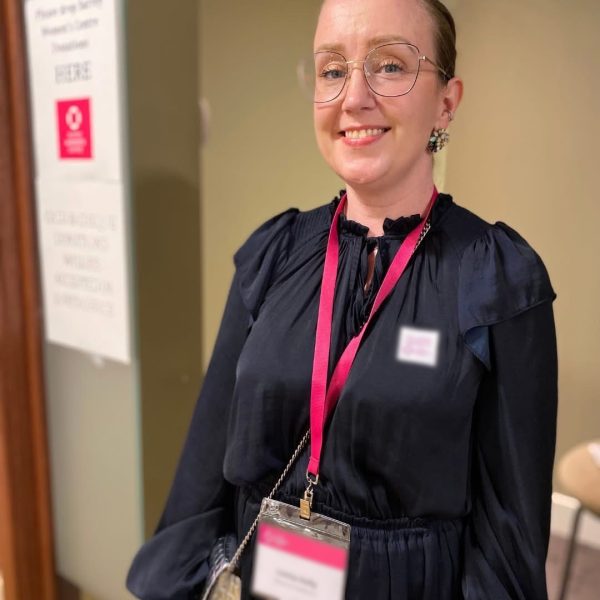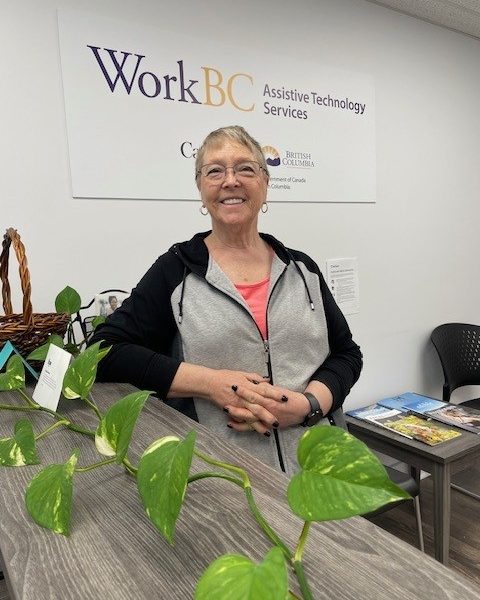WorkBC Assistive Technology Services Helps Gabriel Move Safely at Work

Gabriel is self-employed in the tech field. He works in an office and needs to wear leg orthoses for moving around in the office space, as well as to and from work.
“I have a bone condition, osteogenesis imperfecta, commonly known as ‘brittle bones.’ The condition makes me easily susceptible to fractures and therefore needing braces for support. These create challenges to carry out my work tasks,” he shares.
WorkBC Assistive Technology Services Helps Lovisa Thrive at Work

Lovisa works with an organization helping women fleeing abuse. Her job involves talking with clients in-person and over the phone, a task made difficult by her hearing loss.
“I help them find a safe place to stay and other resources that they need,” she explains. “I have limited hearing in both ears since birth. It impacts my work in a way that is very challenging, I am taking down wrong information and mishearing things.”
New Hearing Aids Help Rai Feel “Secure and Confident” at Work

Rai works as a health care assistant, taking care of seniors and other patients who need help with their everyday needs. She has severe hearing loss and needed hearing aids. She learned about WorkBC Assistive Technology Services (ATS) from a co-worker and decided to apply.
“They helped me in funding, so I was able to buy the top-quality hearing aids. They guided me through every step and were very informative to me. I wouldn’t have been able to get the aids without their support,” she shares. “I would not have been able to continue my job without my hearing aids.”
“The Hearing Aids Have Made My Job Easier [. . .] and Less Stressful”

Brenda works as a Registered Dietitian on Vancouver Island. She provides nutritional education and counseling to clients with various health conditions both in-person and virtually, and also facilitates in-person group nutrition programs.
“I have hearing loss in both ears, and this was impacting my ability to communicate effectively with my clients in-person. I would often have to ask them to repeat themselves. In group settings, I would have to move closer to people sitting at the back of the room to hear them properly,” she explains.
New Hearing Aids Help Cameron’s Job Search

Having previously been employed as a security guard, Cameron is looking for work in a new field. He has hearing loss, which was making his job search more difficult as he has a hard time hearing other people.
His WorkBC Employment Centre referred him to WorkBC Assistive Technology Services for help funding the hearing aids he needs for his job search and future employment. He applied and was quickly approved for a new set of hearing aids.
Steve’s New Hearing Aids Help Him Communicate at Work

Steve works in construction for a regional health authority at a local hospital. As a project supervisor, his work involves communicating with a large construction team, hospital staff, inspectors, consultants, and more.
He has no residual hearing in his left ear, and severe to profound hearing loss in his right. While he had hearing aids previously, they were getting old and the battery would die quickly, often in the middle of important meetings over Microsoft Teams.
WorkBC Assistive Technology Services Helps Mitra Get the Hearing Aids She Needs in Her Job Search

Mitra is currently looking for work, and she has hearing loss. Her WorkBC Centre referred her to WorkBC Assistive Technology Services for help funding the hearing aids she needs for the job search process and in her future employment. She applied and was quickly approved.
“The Assistive Technology Services program helped me by providing funding for a hearing aid. This accommodation has improved my ability to communicate effectively,” she shares.
“I Look Forward to My Workday,” Gloria’s New Hearing Aids Make a Big Difference on the Job

Gloria works as a pharmacy assistant, handling everything from helping customers get their prescriptions to stocking the shelves. Recently, her hearing aids died, making it much more difficult to do her job.
Her hearing aid specialist referred her to WorkBC Assistive Technology Services for help funding a new set of hearing aids. Assistive Technology Services staff walked her through every step of the process, ensuring that she got the hearing aids she needs for work.
WorkBC Assistive Technology Services Helps Donna Better Serve Customers

Donna works in a busy pharmacy that prides itself on its customer service. She helps customers find items, discusses the benefits of different products, and tries to make them feel welcome and comfortable in the store. However, her hearing loss was making it more difficult to help customers.
“I had issues hearing their questions and comments over the sounds that occur in a public place,” she shares. “I was always asking them to repeat their question, which when someone was in a hurry could irritate them. I also had to ask my co-workers to repeat themselves for the same reasons. I have found that most people are quite considerate, but as the hearing loss progressed, it became more of an issue for me.”
New Hearing Aids Helps Perez Re-Gain Her Self-Confidence

Perez works as a part-time manager at a fast-food restaurant. Working in a busy kitchen environment with a lot of noise, she found her hearing loss was affecting her ability to work.
“I was diagnosed with a bilateral, moderate-to-moderately severe sensorineural hearing loss, which has a big impact on my work,” she explains. “My self-confidence was affected as I can not work properly. I need to ask my colleagues what they were saying and sometimes I [would] just guess what they really want to say, which [would] lead to a wrong decision or wrong task.”



